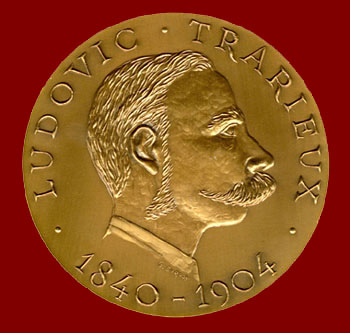LUDOVIC-TRARIEUX
INTERNATIONAL HUMAN RIGHTS PRIZE 2011
Ludovic-Trarieux
International Human Rights Prize 2011
Prix International des droits de l'homme
Ludovic-Trarieux 2011
Premio Internacional de Derechos Humanos Ludovic Trarieux 2011
Internationalen
Ludovic-Trarieux-Menschenrechtspreis 2011
Prêmio
Internacional de Direitos Humanos Ludovic Trarieux 2011
Premio
Internazionale per i Diritti Umani Ludovic Trarieux 2011
Ludovic Trarieux Internationale Mensenrechtenprijs 2011
Depuis/Since/Desde/Dal/Seit 1984
“L’hommage des avocats à un avocat ”
“The award
given by lawyers to a lawyer”
“El homenaje de abogados a un abogado ”
“L'omaggio
degli avvocati ad un avvocato”
“Die Hommage von Anwälten zu einem Anwalt”
The Ludovic-Trarieux
International Human Rights Prize 2011
will be presented on
1st December 2011 in Brussels
by Viviane REDING,
Vice president of
European Union, commissioner for Justice, Fundamental Rights and Citizenship
to

![]() Fathi TERBIL
Fathi TERBIL
(Libya)
On May 30th 2011, in ROMA, , a Jury of 21 European lawyers
meeting decided to award you the "LUDOVIC-TRARIEUX INTERNATIONAL HUMAN
RIGHTS PRIZE » 2011 tto Mr Fathi TERBIL, lawyer in Benghazi.
Fathi Terbil (Arabic : فتحي
طربيل), 41 years-old,
is a Libyan lawyer and human rights activist. He represents the relatives of
over 1000 prisoners allegedly killed by Libyan security forces in Abu Salim
Prison in 1996.
Fathi Terbil's arrest in
February 2011 sparked a demonstration in Benghazi on 15 February by around 200
relatives of the deceased prisoners, which began the 2011 Libyan protests.
The protests reportedly began
after the arrest of Fathi Terbil who represents relatives of more than 1,000
prisoners allegedly massacred by security forces in Tripoli's Abu Salim jail in
1996. He was later said to have been freed.
Several years ago Terbil got
the best case of his life when the Qadhafi regime brutally suppressed a mutiny
at Abu Slim prison near Tripoli in 1996. Human rights organisations say 1,200
prisoners were massacred in two or three hours. One of Terbil`s brothers,
cousins and a brother-in-law were among the deceased. The prisoners mutinied to
demand better conditions, fair trials and visiting rights.
Since agreeing to represent a
group of families in Benghazi, who lost loved ones in the crackdown, Terbil has
been arrested seven times.
On 17 April 2010, he was demonstrating as the lead
coordinator for the victim's families, of the Abu Salim prison massacre in
marching in front of Benghazi Court demanding that the Libyan government
disclose the facts and events surrounding the June 1996 massacre.
A government supported families' association for the prison
guards and police involved in the massacre rallied a counter-protest and
attacked the victims' families. The Secretary of the association led the throng armed with a
large machete. He slashed the head of
Fathi Tarbil, who would later be taken to hospital for emergency treatment.
Four days after massive
protests forced Egyptian president Hosni Mubarak to resign after nearly 30
years in power, the Libyan security forces came for Terbil again.
On Feb 15, about 20 heavily
armed security personnel came to arrest him at home. He was taken to Abdallah
Senussi, who is in charge of Qadhafi`s security personnel and who was in
Benghazi. The news spread quickly among the victims` families who decided to
demonstrate for his release, with a protest up to 2000 people in front of
Police Headquarters in Benghazi.
Fathi Terbil was finally
released at dawn on February 16.
On Feb 17, the uprising began
in Benghazi and the city fell quickly to Qadhafi`s opponents. This was
accompanied by simultaneous protests in Al Bayda and Az Zintan, where police
and security buildings were set on fire. Protests continued throughout the
following day, growing in size. A police station was also set into fire in
Al-Quba.
On 20 February, Terbil told Al Jazeera that
security forces - sometimes firing from civilian cars without license plates -
had killed dozens, perhaps hundreds, of protestors in Benghazi.
Created in 1984, the "International
Human Rights Prize Ludovic -Trarieux” is awarded to " a lawyer, regardless
of nationality or Bar, who thoroughout his career has illustrated, by his
activity or his suffering, the defence of human rights, the promotion of
defence rights, the supremacy of law, and the struggle against racism and
intolerance in any form ".
It is the oldest and most prestigious award given to a lawyer in the world,
commemorating the memory of the French lawyer, Ludovic Trarieux (1840-1904),
who in the midst of the Dreyfus Affair, in France, in 1898, founded the "
League for the Defence of Human Rights and the Citizen ", because, he
said: " It was not only the single cause of a man which was to be
defended, but behind this cause, law, justice, humanity ".
The first Prize was awarded on March 29th, 1985 to Nelson Mandela then
in jail. It was officially presented to his daughter, Zenani Mandela Dlamini,
on April 27th 1985, in front of forty presidents of Bars and Law Societies from
Europe and Africa. It was the first award given to Mandela in France and the
first around the world given by lawyers. On February 11th 1990, Nelson Mandela
was released. Since then, it was decided that the Prize would be awarded again.
Since 2003, the Prize is awarded every year in partnership by the Human
Rights Institute of The Bar of Bordeaux, the Human Rights Institute of the Bar
of Paris, the Human Rights Institute of The Bar of Brussels, l'Unione forense
per la tutela dei diritti dell'uomo (Roma), the Bar of Luxemburg, the Union Internationale des Avocats (UIA),
Rechtsanwaltskammer Berlin, and the European Bar Human Rights Institute (IDHAE)
